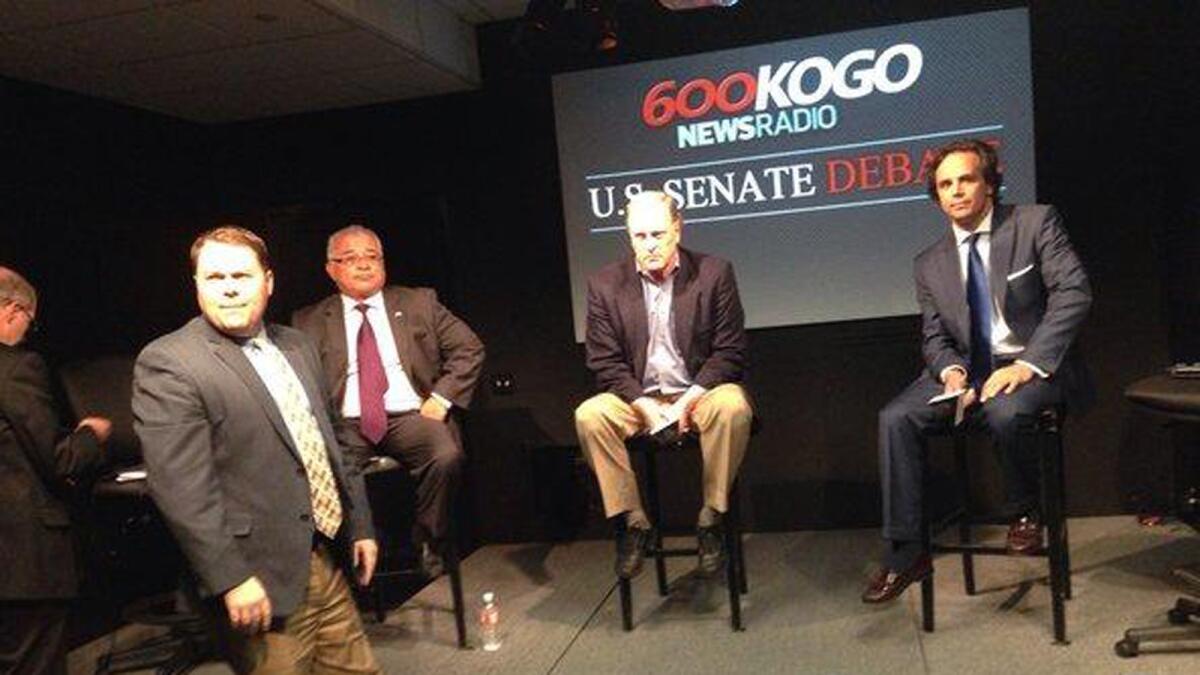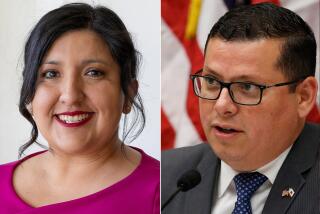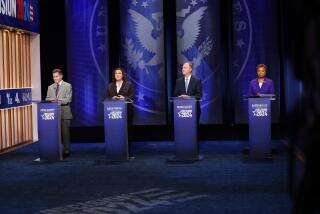Chavez exit stuns Republican Senate debate, shakes up local race

Assemblyman Rocky Chavez, at left, ended his U.S. Senate bid moments into the GOP candidates’ debate.
Republican Senate candidate Rocky Chavez, an Oceanside assemblyman and former Marine colonel, abruptly dropped out of the race Monday evening just as the first GOP debate was about to begin.
Chavez’s announcement startled the small audience huddled inside the KOGO AM 600 radio studio in San Diego for what was expected to be a three-candidate forum.
He said it was crucial for a GOP candidate to survive the June 7 primary, and he insinuated that the top three Republicans in the race could splinter their party’s vote and allow Democratic hopefuls Atty. Gen. Kamala Harris and Rep. Loretta Sanchez of Santa Ana to have the ballot to themselves in November.
“I’ve given this a lot of thought and prayer, with my wife and family, and I think the best role I can fill for the Republican Party and moving the agenda forward … is to run for my Assembly seat, since I’m not going to be running for the United States Senate,” Chavez said.
With that, Chavez walked off the debate stage and out of the studio.
Under California’s top-two primary system, the two candidates who receive the most votes in the June primary, regardless of party, will face off in the general election.
A Field Poll released in January showed Harris and Sanchez far ahead of the Republican pack. Among registered voters, 27% said they favored Harris and 15% supported Sanchez. Chavez, who is Latino and was viewed as more centrist than his GOP rivals, led the top three Republican candidates with 7%. George “Duf” Sundheim and Tom Del Beccaro, both former chairmen of the California Republican Party, came in at 3% each.
Join the conversation on Facebook >>
Despite his slight edge in the polls, Chavez had trouble raising money for his Senate campaign. At the end of 2015, Chavez reported having $369 in cash on hand and $42,889 in debts, according to the Federal Election Commission.
“I appreciate Rocky doing the thing for the state and the party,” Sundheim said during a break in the debate, which focused on immigration, tax policy and federal funding for Planned Parenthood.
Sundheim said he expects to benefit the most from Chavez’s departure, since both candidates made efforts to appeal to moderate Republicans and independents. For example, both men support a pathway to “legal status” for the estimated 11 million undocumented immigrants in the country.
Del Beccaro said Chavez’s decision increases the odds that one consensus Republican candidate will emerge and make it to the November election. Del Beccaro said, of course, he thinks he will prevail.
“I think Duf’s policies are too much like the Democrats on many issues, and therefore he doesn’t really give Republicans a voice,” Del Beccaro said.
Chavez’s decision to run for reelection also shakes up the race that already was underway to replace him in Assembly District 76. Candidates include Republicans Phil Graham, the stepson of former Gov. Pete Wilson, and Oceanside City Councilman Jerry Kern.
Graham raised $355,000 for his campaign in 2015 and had $221,000 in cash on hand at the end of the year. Kern raised $184,000 and had $138,000 in the bank, state campaign finance records show.
Chavez had $601 in his Assembly campaign account at the end of 2015.
ALSO
Finding statewide office hard to attain, tea party stakes claim to city, county races
Cities want to raise the minimum wage. But it’s complicated.
California should help pay for earthquake early warnings, state lawmakers say
More to Read
Get the L.A. Times Politics newsletter
Deeply reported insights into legislation, politics and policy from Sacramento, Washington and beyond. In your inbox three times per week.
You may occasionally receive promotional content from the Los Angeles Times.







